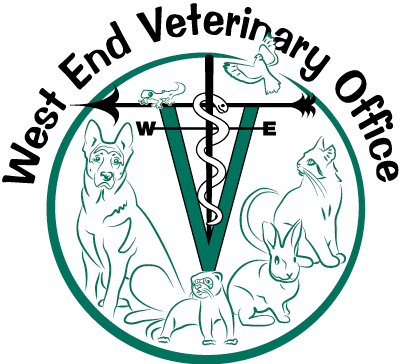Newburgh Veterinary Dentistry
Keep your pet smiling for many years to come with dental care from West End Veterinary Office. Even the most devoted pet parents can forget about their pet’s oral health, but our veterinary team is here to keep your pet’s dental health on track. When you bring your pet in for their annual wellness exams, our veterinary team will examine your pet’s mouth as part of their comprehensive physical exam. If we think your pet needs advanced oral care, we’ll let you know. Oral health can have a huge impact on your pet’s overall health!
Make sure your pet is examined regularly. Schedule your next appointment by calling (845) 565-0804 or by contacting us online.
Dental Disease & Your Pet's Health
Dental disease, also known as periodontal disease, is the most common disease affecting cats and dogs. It’s easily overlooked but can devolve into a serious health issue. West End Veterinary Office will help you stay on top of your pet’s oral health.
If your pet is exhibiting any of the below symptoms, they might be suffering from advanced dental disease:
- Unusually bad or smelly breath
- Blood in your pet’s saliva or water dish
- Difficulty eating or loss of appetite
- Excessive drooling
- Loose or missing teeth
Bring your pet in to see us as soon as you notice any combination of these symptoms. We’ll help you get your pet back on track to a healthy, happy smile!
Periodontal disease is caused by an excessive buildup of tartar on the teeth. Plaque is a bacterial film that hardens to tartar on the teeth as it dies. It’s exactly the same in pets as it is in humans! For humans, regular brushing can help dislodge the plaque and keep the teeth healthy. Since many pets don’t have their teeth brushed regularly, tartar continues to build up on the teeth more and more, eventually moving below the gumline causing dental disease.
In the early stages of the disease, brushing or chewing on special toys or treats may help dislodge the plaque and prevent the progression of the disease. But once the plaque moves below the gumline, only a professional dental cleaning under anesthesia can completely clean your pet’s teeth.
As it does in humans, diseased teeth lead to pain, weakening and destruction of jawbone, systemic disease and even organ failure.
Let’s work together to keep your pet healthy and to keep that kissable breath!
Dental Care
West End Veterinary Office offers a fully equipped dental suite. Every pet needs anesthesia in order to provide proper dental care. Regular bi-annual or annual cleaning will help limit anesthesia time by keeping periodontal disease to a minimum. Utilizing our licensed professionals and state of the art monitoring allows us the capabilities to safely monitor your pet while they are under anesthesia. We use tools that are the same or similar to those used by human dentists. In order to clean your pet’s teeth, while under anesthesia we do a full oral exam, take full mouth x-rays. remove tartar, clean under the gums and polish your pet’s teeth to a healthy shine. Your pet will come out with a bright, white smile!
Don’t wait until you pet has terrible breath!
Allowing a pet groomer to brush your pet’s teeth once every 2-3 months does absolutely nothing to prevent bad breath or dental disease.
In the event your pet has advanced dental disease, which, unfortunately; is quite common, we have special training in proper treatment and removal of those diseased teeth. We strongly recommend regular tooth brushing and professional dental cleanings as the best way to avoid painful and costly advanced dental disease.
Frequently Asked Questions
How Can I Prevent Dental Problems in My Pet?
- Regular Home Care: Daily brushing is the most effective way to prevent dental problems.
- Dental Chews and Toys: Encourage chewing on dental chews and toys designed to help remove plaque.
- Diet: Avoid feeding your pet a diet high in carbohydrates that can contribute to plaque buildup.
- Regular Checkups: Schedule regular veterinary dental checkups for your pet, typically every 6 months.
What are the Signs of Dental Problems in My Pet?
- Bad Breath: Persistent bad breath, even after brushing.
- Difficulty Chewing: Dropping food, favoring one side of the mouth.
- Pawing at the Mouth: Trying to dislodge food or relieve discomfort.
- Red or Swollen Gums: Signs of gum inflammation.
- Yellow or Brown Teeth: Indicates plaque and tartar buildup.
How often should my pet have a dental cleaning?
The frequency of professional dental cleanings varies depending on the individual pet and their breed.
- Small breed dogs: Often require more frequent cleanings due to a higher predisposition to dental disease.
- Regular checkups: Most veterinarians recommend annual dental checkups for all pets.
- Professional cleanings: The frequency of professional cleanings will be determined by our veterinarian based on your pet's oral health.
For questions about dental services at West End Veterinary Office, please call (845) 565-0804 or contact us online.
